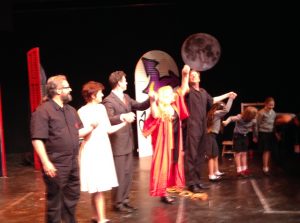Their Hearts Belong to DADA
When Gertrude Stein crowed, “Kill the 19th century dead,” her target in the realm of music was Richard Wagner, both his music and his philosophy. Among the coterie of other creative expatriates living in Stein’s Paris of the 1920s was the young Czech composer Bohuslav Martinů, whose cheeky one-act opera from 1928 Tears of the Knife is Bodhi Tree Concerts‘ offering in the current San Diego Fringe Festival.
Since Wagner’s most exalted operatic love story Tristan und Isolde ended in a grand Liebestod, the immolation of the two lovers together in order to reach eternity on the same dispatch, Martinů has his Tears of the Knife protagonist Eleonora madly in love with a man who has been recently hanged and whose suspended corpse dangles at the edge of the stage. The Liebe that young Eleonora professes is directed at a lover who is already Tod. Her bossy mother attempts to engage Eleonora with a lively young man who is actually Satan in disguise, although Mommie Dearest lets the audience know that she’ll take the dashing Mr. Satan if her daughter won’t.
This cynical modernism is just the sort of fare that Fringe Festival audiences devour eagerly, and Bodhi Tree served it up with first-rate musicianship and playful direction. The trio of vocalists—soprano Christen Blair Horne as Eleonora, contralto Sharmay Musacchio as the Mother, and baritone Jordan Miller—employed their best operatic training to infuse their vocal lines with passionate intent, but they wisely chose a cabaret style of phrasing to align the libretto by Georges Ribemont-Dessaignes with his Dadaist sympathies.
Martinů’s chorus of three children—yes, actual youngsters, not mezzo-sopranos impersonating children—pushed the action along with their taunts and playful cries. It is easy to see this trio as a spoof on Wagner’s three Rhinemaidens that open Das Rheingold or his three Norns from Götterdämmerung.
Martinů arrived in Paris in 1923 to study with composer Albert Roussel, a year before Francis Poulenc’s Dadaist ballet Les biches was performed to some acclaim, and other members of les Six turned out their own kinky ballets and theater pieces while the 1920s roared. Tears of the Knife was finished in the same year Kurt Weill and Bertold Brecht staged their Three-Penny Opera in Berlin, another cynical ballad opera that punctured Wagner’s exalted dramaturgy and rejected his roiling chromatic harmonic idiom.
Not surprisingly, Martinů’s set pieces suggest that mildly jazz-infused cabaret ballad style that Weill turned out so brilliantly in his opera collaborations with Brecht. Tears of the Knife does not sport a hit equal to Three-Penny’s “Mack the Knife,“ but the soprano’s big reflective ballad/aria is one I would gladly hear again. Accordion virtuoso Mark Danisovszky reduced some of Martinů’s colorful orchestra for his own instrument to augment the piano reduction played with such panache by the show’s music director Bryan Verhoye. This combination of instruments said Paris cabaret in bold, upper-case letters. Although the composer was not immune to the neo-classical music fad that swept Paris after World War I, his ideas struck me as fresh and inviting.
Martinů wrote some 16 operas according to The New Grove, so perhaps there may be something lurking in this repertory—or other theatre pieces from that era—that San Diego Opera may find enticing to stage in venues such as Bread and Salt or the North Park Theatre. Hats off to Bodhi Tree Concerts for bringing this obscure gem to the stage.
[themify_box style=”shadow” ]
This was review was based on the performance of August 1, 2015, at the Lyceum Stage in Horton Plaza. The work, sung in uncredited English translation, played from July 23 to August 2, 2015 in that venue as part of the 2015 San Diego Fringe Festival.
[/themify_box]

